初二让步状语从句讲解学生
- 格式:docx
- 大小:26.12 KB
- 文档页数:13

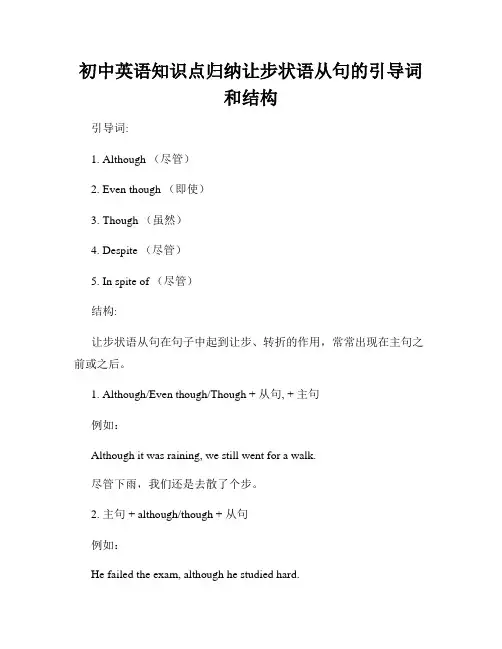
初中英语知识点归纳让步状语从句的引导词和结构引导词:1. Although (尽管)2. Even though (即使)3. Though (虽然)4. Despite (尽管)5. In spite of (尽管)结构:让步状语从句在句子中起到让步、转折的作用,常常出现在主句之前或之后。
1. Although/Even though/Though + 从句, + 主句例如:Although it was raining, we still went for a walk.尽管下雨,我们还是去散了个步。
2. 主句 + although/though + 从句例如:He failed the exam, although he studied hard.虽然他学习很努力,但还是考砸了。
3. Despite/In spite of + 名词/动名词/代词, + 从句例如:Despite the heavy rain, they managed to finish the race.尽管下着大雨,他们还是成功完成了比赛。
4. 从句 + despite/in spite of + 名词/动名词/代词例如:She passed the test, despite the fact that she didn't study much.尽管她没怎么学习,她还是通过了考试。
5. In spite of the fact that + 从句, + 主句例如:In spite of the fact that she was tired, she continued working.尽管她很累,她还是继续工作。
6. Though + 倒装句例如:Though tired they were, they still kept going.尽管他们很疲惫,他们还是坚持下去。
7. However + adj/adv, + 句子例如:However difficult the task is, we will do our best.无论任务多么困难,我们会尽力而为。
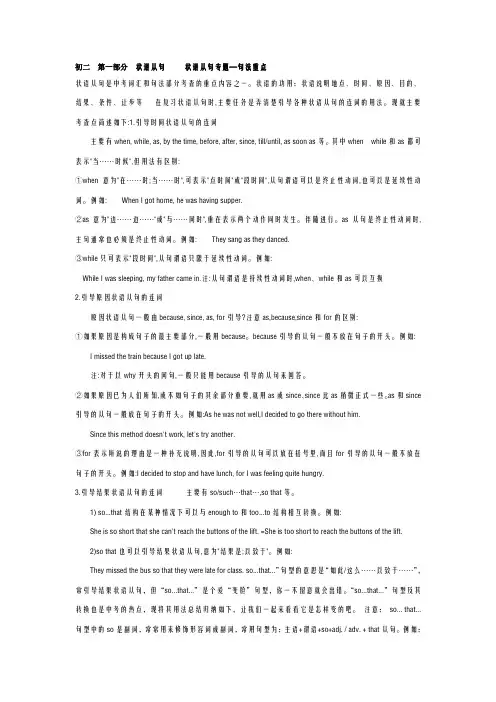
初二第一部分状语从句状语从句专题—句法重点状语从句是中考词汇和句法部分考查的重点内容之一。
状语的功用:状语说明地点、时间、原因、目的、结果、条件、让步等在复习状语从句时,主要任务是弄清楚引导各种状语从句的连词的用法。
现就主要考查点简述如下:1.引导时间状语从句的连词主要有when, while, as, by the time, before, after, since, till/until, as soon as等。
其中when while和as都可表示"当……时候",但用法有区别:①when意为"在……时;当……时",可表示"点时间"或"段时间",从句谓语可以是终止性动词,也可以是延续性动词。
例如: When I got home, he was having supper.②as意为"边……边……"或"与……同时",重在表示两个动作同时发生。
伴随进行。
as从句是终止性动词时,主句通常也必须是终止性动词。
例如: They sang as they danced.③while只可表示"段时间",从句谓语只限于延续性动词。
例如:While I was sleeping, my father came in.注:从句谓语是持续性动词时,when、while和as可以互换2.引导原因状语从句的连词原因状语从句一般由because, since, as, for引导?注意as,because,since和for的区别:①如果原因是构成句子的最主要部分,一般用because。
because引导的从句一般不放在句子的开头。
例如:I missed the train because I got up late.注:对于以why开头的问句,一般只能用because引导的从句来回答。
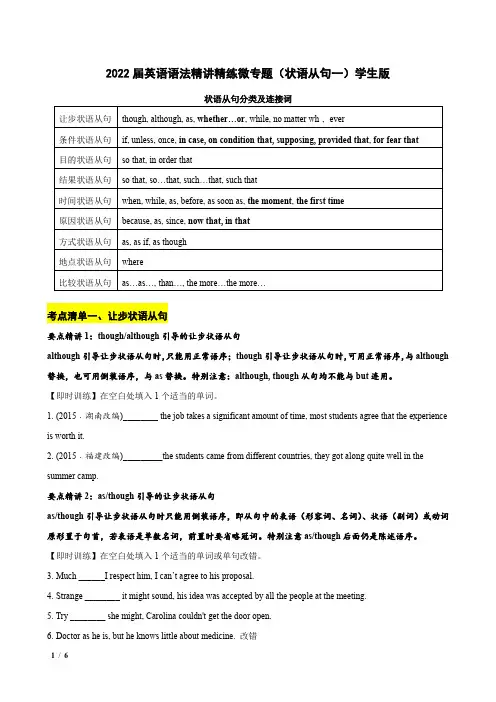
2022届英语语法精讲精练微专题(状语从句一)学生版状语从句分类及连接词考点清单一、让步状语从句要点精讲1:though/although引导的让步状语从句although引导让步状语从句时,只能用正常语序;though引导让步状语从句时,可用正常语序,与although 替换,也可用倒装语序,与as替换。
特别注意:although, though从句均不能与but连用。
【即时训练】在空白处填入1个适当的单词。
1. (2015﹒湖南改编)________ the job takes a significant amount of time, most students agree that the experience is worth it.2. (2015﹒福建改编)_________the students came from different countries, they got along quite well in the summer camp.要点精讲2:as/though引导的让步状语从句as/though引导让步状语从句时只能用倒装语序,即从句中的表语(形容词、名词)、状语(副词)或动词原形置于句首,若表语是单数名词,前置时要省略冠词。
特别注意as/though后面仍是陈述语序。
【即时训练】在空白处填入1个适当的单词或单句改错。
3. Much ______I respect him, I can’t agree to his proposal.4. Strange ________ it might sound, his idea was accepted by all the people at the meeting.5. Try ________ she might, Carolina couldn't get the door open.6. Doctor as he is, but he knows little about medicine. 改错7. Heavy as it is raining, they are still working outside. 改错要点精讲3:while引导的让步状语从句while“虽然,尽管”,多用于正式文体,且多位于句首,可以与though, although替换。
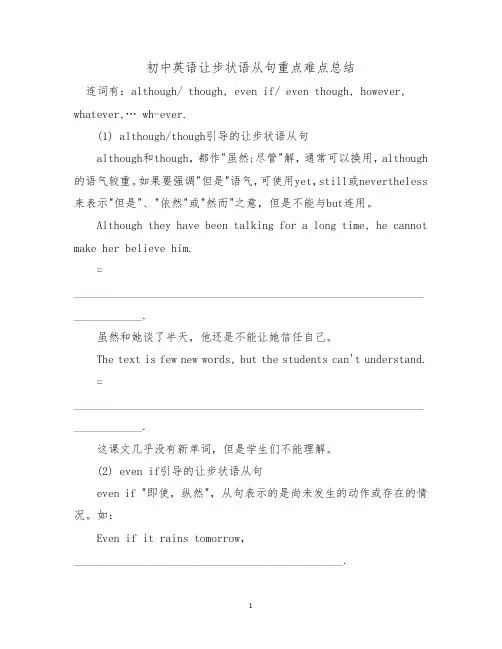
初中英语让步状语从句重点难点总结连词有:although/ though, even if/ even though, however, whatever,… wh-ever.(1) although/though引导的让步状语从句although和though,都作"虽然;尽管"解,通常可以换用,although 的语气较重。
如果要强调"但是"语气,可使用yet,still或nevertheless 来表示"但是"、"依然"或"然而"之意,但是不能与but连用。
Although they have been talking for a long time, he cannot make her believe him.=_____________________________________________________________ ____________.虽然和她谈了半天,他还是不能让她信任自己。
The text is few new words, but the students can't understand.=_____________________________________________________________ ____________.这课文几乎没有新单词,但是学生们不能理解。
(2) even if引导的让步状语从句even if "即使,纵然",从句表示的是尚未发生的动作或存在的情况。
如:Even if it rains tomorrow,_______________________________________________.即使明天下雨,我们也不改变计划。
Even if I failed again, I will not _____________ the experiment.即使我再次失败,我也不会放弃实验。
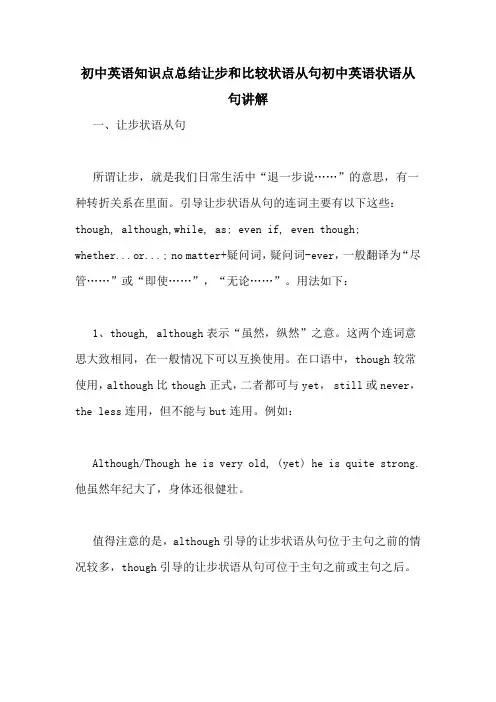
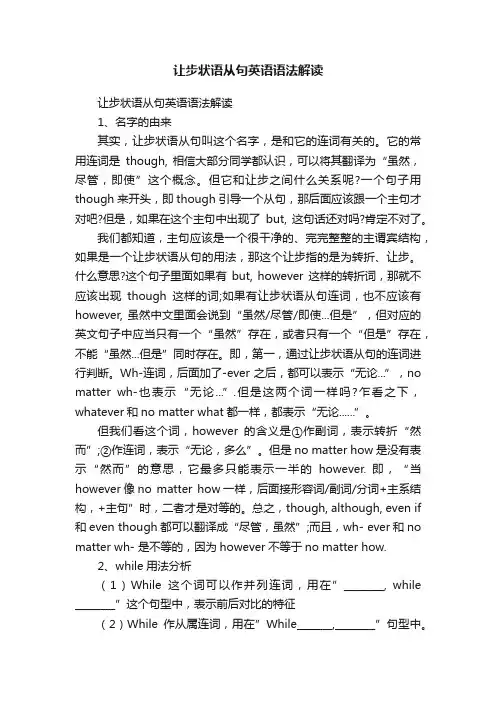
让步状语从句英语语法解读让步状语从句英语语法解读1、名字的由来其实,让步状语从句叫这个名字,是和它的连词有关的。
它的常用连词是though, 相信大部分同学都认识,可以将其翻译为“虽然,尽管,即使”这个概念。
但它和让步之间什么关系呢?一个句子用though来开头,即though引导一个从句,那后面应该跟一个主句才对吧?但是,如果在这个主句中出现了but, 这句话还对吗?肯定不对了。
我们都知道,主句应该是一个很干净的、完完整整的主谓宾结构,如果是一个让步状语从句的用法,那这个让步指的是为转折、让步。
什么意思?这个句子里面如果有but, however这样的转折词,那就不应该出现though这样的词;如果有让步状语从句连词,也不应该有however, 虽然中文里面会说到“虽然/尽管/即使...但是”,但对应的英文句子中应当只有一个“虽然”存在,或者只有一个“但是”存在,不能“虽然...但是”同时存在。
即,第一,通过让步状语从句的连词进行判断。
Wh-连词,后面加了-ever之后,都可以表示“无论...”,no matter wh-也表示“无论...”.但是这两个词一样吗?乍看之下,whatever和no matter what都一样,都表示“无论......”。
但我们看这个词,however的含义是①作副词,表示转折“然而”;②作连词,表示“无论,多么”。
但是no matter how是没有表示“然而”的意思,它最多只能表示一半的however. 即,“当however像no matter how一样,后面接形容词/副词/分词+主系结构,+主句”时,二者才是对等的。
总之,though, although, even if 和even though都可以翻译成“尽管,虽然”;而且,wh- ever和no matter wh- 是不等的,因为however不等于no matter how.2、while用法分析(1)While这个词可以作并列连词,用在”________, while ________”这个句型中,表示前后对比的特征(2)While作从属连词,用在”While_______,________”句型中。
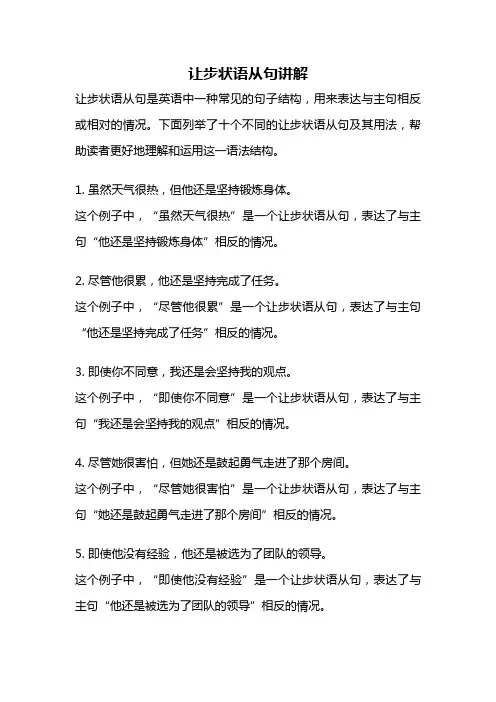
让步状语从句讲解让步状语从句是英语中一种常见的句子结构,用来表达与主句相反或相对的情况。
下面列举了十个不同的让步状语从句及其用法,帮助读者更好地理解和运用这一语法结构。
1. 虽然天气很热,但他还是坚持锻炼身体。
这个例子中,“虽然天气很热”是一个让步状语从句,表达了与主句“他还是坚持锻炼身体”相反的情况。
2. 尽管他很累,他还是坚持完成了任务。
这个例子中,“尽管他很累”是一个让步状语从句,表达了与主句“他还是坚持完成了任务”相反的情况。
3. 即使你不同意,我还是会坚持我的观点。
这个例子中,“即使你不同意”是一个让步状语从句,表达了与主句“我还是会坚持我的观点”相反的情况。
4. 尽管她很害怕,但她还是鼓起勇气走进了那个房间。
这个例子中,“尽管她很害怕”是一个让步状语从句,表达了与主句“她还是鼓起勇气走进了那个房间”相反的情况。
5. 即使他没有经验,他还是被选为了团队的领导。
这个例子中,“即使他没有经验”是一个让步状语从句,表达了与主句“他还是被选为了团队的领导”相反的情况。
6. 虽然这个菜很辣,但我还是觉得很好吃。
这个例子中,“虽然这个菜很辣”是一个让步状语从句,表达了与主句“我还是觉得很好吃”相反的情况。
7. 尽管她晚上睡得晚,但她依然每天早起锻炼。
这个例子中,“尽管她晚上睡得晚”是一个让步状语从句,表达了与主句“她依然每天早起锻炼”相反的情况。
8. 即使他没有时间,他还是会尽力帮助别人。
这个例子中,“即使他没有时间”是一个让步状语从句,表达了与主句“他还是会尽力帮助别人”相反的情况。
9. 虽然这个问题很困难,但他还是成功找到了解决方法。
这个例子中,“虽然这个问题很困难”是一个让步状语从句,表达了与主句“他还是成功找到了解决方法”相反的情况。
10. 尽管他很生气,他还是忍住了不发火。
这个例子中,“尽管他很生气”是一个让步状语从句,表达了与主句“他还是忍住了不发火”相反的情况。
通过以上十个不同的让步状语从句的例子,我们可以看到让步状语从句的用法非常灵活,可以用于不同的语境中,帮助我们表达与主句相反或相对的情况。
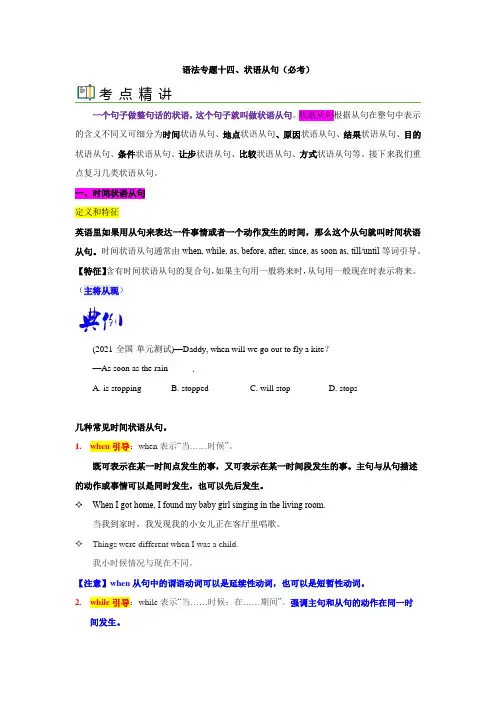
语法专题十四、状语从句(必考)一个句子做整句话的状语,这个句子就叫做状语从句。
状语从句根据从句在整句中表示的含义不同又可细分为时间状语从句、地点状语从句、原因状语从句、结果状语从句、目的状语从句、条件状语从句、让步状语从句、比较状语从句、方式状语从句等。
接下来我们重点复习几类状语从句。
一、时间状语从句定义和特征英语里如果用从句来表达一件事情或者一个动作发生的时间,那么这个从句就叫时间状语从句。
时间状语从句通常由when, while, as, before, after, since, as soon as, till/until等词引导。
【特征】含有时间状语从句的复合句,如果主句用一般将来时,从句用一般现在时表示将来。
(主将从现)(2021·全国·单元测试)—Daddy, when will we go out to fly a kite?—As soon as the rain _____.A. is stoppingB. stoppedC. will stopD. stops几种常见时间状语从句。
1.when引导:when表示“当……时候”。
既可表示在某一时间点发生的事,又可表示在某一时间段发生的事。
主句与从句描述的动作或事情可以是同时发生,也可以先后发生。
✧When I got home, I found my baby girl singing in the living room.当我到家时,我发现我的小女儿正在客厅里唱歌。
✧Things were different when I was a child.我小时候情况与现在不同。
【注意】when从句中的谓语动词可以是延续性动词,也可以是短暂性动词。
2.while引导:while表示“当……时候;在……期间”。
强调主句和从句的动作在同一时间发生。
考点精讲✧My mom came in while I was watching TV. 我正在看电视的时候,妈妈进来了。
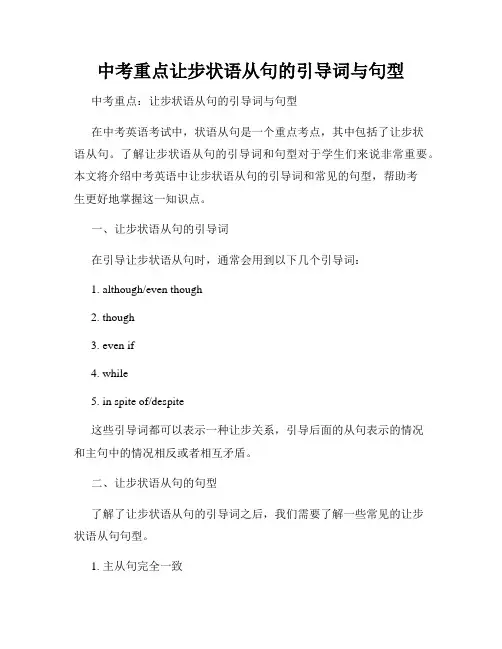
中考重点让步状语从句的引导词与句型中考重点:让步状语从句的引导词与句型在中考英语考试中,状语从句是一个重点考点,其中包括了让步状语从句。
了解让步状语从句的引导词和句型对于学生们来说非常重要。
本文将介绍中考英语中让步状语从句的引导词和常见的句型,帮助考生更好地掌握这一知识点。
一、让步状语从句的引导词在引导让步状语从句时,通常会用到以下几个引导词:1. although/even though2. though3. even if4. while5. in spite of/despite这些引导词都可以表示一种让步关系,引导后面的从句表示的情况和主句中的情况相反或者相互矛盾。
二、让步状语从句的句型了解了让步状语从句的引导词之后,我们需要了解一些常见的让步状语从句句型。
1. 主从句完全一致This cake is delicious, although/even though it looks unappetizing.尽管这个蛋糕看起来不好吃,但它很美味。
在这个句子中,主句和从句的主语分别是"this cake"和"it",两者完全一致。
2. 主从句主语不一致Though he is young, he works hard.尽管他年纪轻,但他工作努力。
在这个句子中,主句的主语是"he",从句的主语是"he"。
3. 主从句谓语动词不一致Although it's raining heavily, she still goes out.尽管外面下着大雨,她还是出门了。
在这个句子中,主句的谓语动词是"goes out",从句的谓语动词是"raining"。
4. 用于连词短语中In spite of/despite the bad weather, we had a great time.尽管天气很糟糕,我们过得很愉快。

初中教案学习让步状语从句状语从句在英语语法中起着重要的作用,它可以给句子增加更多的信息,使句子更加准确和丰富。
其中,让步状语从句是一种常见的状语从句类型,它用于表示尽管某种情况存在,但仍然发生了另一种情况。
本文将从让步状语从句的定义、结构和用法等方面进行探讨和学习。
1. 让步状语从句的定义让步状语从句是指在表示两种情况或条件之间的转折关系时使用的从句,用来表明尽管主句情况存在,但从句情况仍然发生。
2. 让步状语从句的结构让步状语从句通常由连词"although"、"though"、"even if"、"even though"引导,从句部分使用陈述语气。
例如:- Although it was raining, we still went for a walk.- Though he is young, he is very talented.- Even if I fail the test, I will keep trying.3. 让步状语从句的用法(1) 用于引出与主句相反的情况:- Although the weather was cold, she still went swimming.- Even though he was tired, he stayed up late to finish his work.在这些句子中,让步状语从句表明尽管主句中的情况是冷天或疲劳,但他们仍然进行了相反的活动。
(2) 用于表示不太可能实现的情况:- Even if we win the lottery, we won't quit our jobs.- Although he studies hard, he may not pass the exam.这些句子中的让步状语从句表明即使中了彩票或努力学习,也不一定能实现主句中的情况。
常用引导词:so… that、such … that1、so和such的用法是一个难点,归纳如下:(1) so + adj./adv. + that句子(2) such a/an + adj. + 单数名词+ that句子= so + adj. + a/an + 单数名词+ that句子(3) such + adj. + 复数名词/不可数名词+ that句子so + many /few +复数名词+ that句子so + much/little +不可数名词+ that句子He got up so early that he caught the first bus.It’s such a good chance that we must not miss it.2、so + adj. / adv. 置于句首,则其后的主句要用部分倒装。
So cold was the weather that we had to stay at home.So sudden was the attack that we had no time to escape.So loudly did he speak that even people in the next room could hear him.So fast does light travel that we can hardly imagine its speed.So much did they eat that they could not move for the next hour.3、such…置于句首时,such后的句子也要使用部分倒装。
Such a nice man did he seem that we all believe him.把下列句子变成倒装句:1. He talked so loud that he annoyed the speaker.=2. He was so brilliant that he made a lot of inventions.=3. It was such a hot day that people could not go out.=4. They had such a fierce dog that no one dared to go near their house=5.The snow fell so fast that our footsteps were soon covered up.=6.Their dog was so fierce that no one dared come near it.=常用引导词:if、unless、as long as、so long as特殊引导词:if only、providing/provided that、suppose that、on condition thatEg:We’ll start our project if the president agrees.You will certainly succeed so long as you keep on trying.Y ou can go where you like as long as you get back before dark.Provided that there is no opposition, we shall hold the meeting here.Suppose (that) this is the most beautiful flower you can find on the earth, then...假如这就是你能在地球上找到的最美丽的花朵,那么.Y ou can use the bicycle on condition that you return it tomorrow.让步状语从句常用引导词:although= though、as、while (一般用在句首)特殊引导词:even if=even though、no matter + 疑问词= 疑问词+ever Eg:Although/Though/As/While I respect him much, I can’t agree to his proposal.尽管我很尊敬他,我却不同意他的建议。
让步状语从句的表达方式初中语法技巧让步状语从句是指通过使用一些特殊的从句结构来表达让步或否定。
在初中英语学习中,正确地使用让步状语从句对于提高语言表达能力和理解复杂句子的能力非常重要。
本文将介绍一些初中语法技巧,帮助学生更好地掌握让步状语从句的表达方式。
一、使用连词"although"和"though"连词"although"和"though"是表达让步的常用连词。
它们在句子中引导让步状语从句,表示与主句意义相反的情况。
例如:1. Although it was raining, we still went to the park.虽然下雨了,但我们仍然去了公园。
2. Though he is young, he is very talented.虽然他很年轻,但他很有才华。
二、使用连词"despite"和"in spite of"连词"despite"和"in spite of"也可以用于引导让步状语从句。
它们的基本用法相同,都表示尽管某种情况存在,但仍然发生相反的情况。
例子如下:1. Despite the heavy traffic, she arrived on time.尽管交通拥堵,她还是准时到达了。
2. In spite of his fear, he managed to jump off the cliff.尽管他害怕,他还是成功地跳下了悬崖。
三、使用连词"while"和"whereas"连词"while"和"whereas"在句子中同样可以引导让步状语从句,表示相对的情况。
两者的基本用法相同,但"whereas"通常用于对比两个相对矛盾的事物。
让步状语从句学习指导让步状语——这是一个比较奇怪的名字。
所谓让步,简单地说就是降低标准或者说是退一步,相当于汉语的“虽然”“尽管”“即使”等。
英语中用于引导让步状语从句的连词不多,主要有although, though, even though, even if等。
1. 用although / though引导:although与though虽然拼写不同,但意思相同,都表示“虽然”,常可互换。
如:Though they are twins, they look entirely different. 他们虽是孪生,但是相貌却完全不同。
Although she didn’t say anything I sensed (that) she didn’t like the idea. 她虽然什么也没说但我已意识到她不喜欢这个主意。
注意,不要按汉语习惯说although…but…。
如:尽管她父亲在公司里,但她那份工作却是靠自己得到的。
误:Although her father is in the firm, but she got the job on her own.正:Although her father is in the firm, she got the job on her own.2. 用even though / even if引导:even though和even if意思相同,均表示“即使”,常可互换。
如:Even though you have a lot of money, I won’t love you. 即使你有很多钱,我也不会爱你。
Even if you saw him pick up the money, you can’t be sure he stole it. 就算你看见是他拾起的钱,你也不能肯定钱就是他偷的。
3. 用whether…or引导:whether…or…的意思是“无论……还是……”“不管……还是……”。
状语从句(一)状语从句概述(二)状语从句详解1. 时间状语从句2.地点状语从句3.条件状语从句4.原因状语从句5.目的状语从句6.结果状语从句7.让步状语从句8. 比较状语从句9.方式状语从句练习一一. 单项填空1. _______ he’s old, he can still carry this heavy bag.A. ThoughB. SinceC. ForD. So2. ---Do you know if he _______ to play basketball with us?---I think he will come if he ______ free tomorrow.A. comes; isB. comes; will beC. will come; isD. will come; will be3. In the zoo if a child _____ into the water and can’t swim, the dolphins may come up ______ him.A. will fall; to helpB. falls; to helpC. will fall; helpD. falls; helping4. I don’t remember ________ he worked in that city when he was young.A. whatB. whichC. whereD. who5. We will stay at home if my aunt ________ to visit us tomorrow.A. comesB. comeC. will comeD. is coming6. The police asked the children _______ cross the street ________ the traffic lights turned green.A. not; beforeB. don’t; whenC. not to; untilD. not; after7. I was late for class yesterday _______ there was something wrong with my bike.A. whenB. thatC. untilD. because8. I’ll go swimming with you if I ________ free tomorrow.A. will beB. shall beC. amD. was9. In the exam, the ________ you are, ______ the _______ mistakes you will make.A. careful; littleB. more careful; fewestC. more careful; fewerD. more careful; less10. You should finish your lessons _______ you go out to play.A. beforeB. afterC. whenD. while11. I hurried _____ I wouldn’t be late for class.A. sinceB. so thatC. as ifD. unless12. When you read the book, you’d better make a mark _______ you have any questions.A. whichB. thatC. whereD. though13. The teacher raised his voice _______ all the students could hear him.A. forB. so thatC. becauseD. in order14. He took off his coat _______ he felt hot.A. becauseB. asC. ifD. since15. It is ______ that we’d like to go out for a walk.A. a lovely dayB. too lovely a dayC. so lovely a dayD. such lovely a day16. Mary had ______ much work to do that she stayed at her office all day.A. suchB. soC. tooD. very17. _______ I felt very tired, I tried to finish the work.A. AlthoughB. BecauseC. AsD. As if18. ______ the day went on, the weather got worse.A. WithB. SinceC. WhileD. As19. ______ well you can drive, you must drive carefully.A. So long asB. In order thatC. No matter howD. The moment20. Write to me as soon as you ________ to Beijing.A. will getB. getC. gettingD. got练习二1. The meeting didn't start___ everyone was there.A. becauseB. untilC. whyD. if2 .The boy ___ to bed ___ his mother came in.A. went not; untilB. didn't go; afterC. went; untilD. didn't go; until3. I won't believe you___ I have seen it with my own eyes.A. beforeB. untilC. afterD. when4 .He ___ home ___ she was satisfied ___ his answer yesterday.A. didn't go; until; withB. wasn't go; after; toC. doesn't go; before; withD. didn't go; until; to5 .He ___ back until the work ___ done.A. isn't; will beB. isn't; isC. won't be; will beD. won't be; is6 .They didn't start the work ___ their teacher came back.A. untilB. whileC. as soon asD. if7. Tom will call me as soon as he ___ Shanghai.A. arrivesB. will reachC. arrives inD. get to8. I'm sure he'll come to see me before he ___ Beijing.A. will leaveB. is leavingC. leaveD. leaves9. I will tell him the news as soon as he___ back.A. comeB. comesC. will comeD. came10. Tom has got a watch. He ___ it for two years. It _______ by his father.A. has bought; was boughtB. has got; is bought ,C. was bought; has bought .D. has had; was bought "'11. When he got to the station, the train ___.A. leftB. had leftC. leavesD. has left12. The boy told his father what he ___ in the street.A. sawB. have seenC. had seenD. see13.We ___ TV when the telephone ____.A. watched; was ringingB. were watching; rangC. watch; ringsD. are watching; rang14.By the end of last term, I___ ten books.A. had finished readingB. have finish readingC. had finish to readD. finish read15. I ___ you for a long time. Where ___ you ___?A. didn't see; did; goB. didn't see; have; goneC. haven't seen; have; beenD. haven't seen; have; gone16. Tom___ China for 3 years.A. has beenB. has been inC. has been toD. has been at17. I won't go to see the film tonight, because I ___ my ticket.A. lostB. have lostC. will loseD. didn't lose18.-Hello! May I speak to Bob?-Sorry, but he ___ for a month.A. had been awayB. was leftC. leftD. has been away19. I ___ him since I began to live in the city.A. knowB. have knownC. knewD. will know20.Zhao Lan ___ already ___ in this school for two years.A. was; studyingB. will; studyC. has; studiedD. are; studying21.Betty didn't go to see the film yesterday ___ she was ill.A. becauseB. butC. untilD. if22 May I sit nearer___I can see more clearly?A. as ifB. so thatC. even ifD. so23. ___ you work hard, you will certainly succeed.A. ThoughB. IfC. BecauseD. For24. ___ he came to study in the university, he has made much progress in the study of English.A. WhileB. WhenC. SinceD. After25. I'd like to go swimming _____ the water is not too cold.A. forB. unlessC. ifD. whether26. There are ___ many league members in class 2 ___ in Class 4.A. both; andB. 'so; thatC. either; orD. as; as27. -Do you have a big library?-No, we don't. At least, not___yours.A. as big asB. as big thanC. as bigger thanD. bigger as28. Suzhou is not ____ beautiful ____ Hangzhou.A. as; thanB. so; asC. even; thanD. /; than29. Iron is more useful ___ any other metal.A. asB. thanC. thenD. so30. I want to know ___ she is going to see a film.A. ifB. thatC. whatD. which31. You are sure to pass the exam ___ you study hard.A. ifB. thoughC. thatD. since32. I'll go to see the film with you___I have time this evening.A. whetherB. soC. ifD. when33. ___ you study harder, you'll never pass the final exam.A. IfB. UntilC. UnlessD. Except34. Although it was raining, still worked in the fields.A. but theyB. and theyC. theyD. and yet they35 .___ there were only five soldiers left at the front, ___ they went on fighting.A. Because; soB. If; andC. Though; butD. Though; /36. ___ she is very old, ___ she can still work eight hours a day.A. Because; soB. Though; butC. As; yetD. Though; yet37. Please answer the question in a loud enough voice ___ all the class may hear.A. so, thatB. orC. in order thatD. and38. Lift it up___I may see it.A. thoughB. so thatC. asD. than39. I hurried___I wouldn't be late for class.A. soB. so thatC. ifD. unless40. We should go by bus ___ we can get there earlier.A. as soon asB. whereC. in order thatD. as41. The dictionary is so expensive ___ I can't buy it.A. becauseB. whenC. thatD. if42. I got there ___ late ___ I didn't see him.A. too; toB. such; thatC. so; thatD. so; as43. It is ___ hot in the room ___ we have to go out for a walk.A. such; thatB. so; thatC. as; asD. such; as44 He has___ an interesting book that we want to read it.A. soB. suchC. the sameD. as。